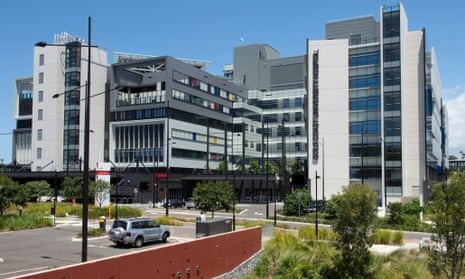A leading infectious diseases physician said a man taken to a Queensland hospital suffering a suspected case of Ebola is just as likely to be suffering from malaria.
A Queensland ambulance spokeswoman confirmed to Guardian Australia that a 25-year-old man had contacted paramedics on Thursday morning after returning from a trip to the Democratic Republic of Congo, and he was undergoing tests in Gold Coast University Hospital.
But associate professor Allen Cheng from Monash University’s department of epidemiology and preventive medicine said the Democratic Republic of Congo was not where the primary outbreak of Ebola had occurred, and that malaria was much more likely.
Malaria, spread by mosquitoes, typically has symptoms including high fevers, shaking chills, and flu-like illness, which were similar to the initial symptoms of Ebola, Cheng said.
The bulk of Ebola cases were coming from Guinea, Liberia, Sierra Leone and Nigeria.
“The Congo is not where all the action is, there are some cases there but it’s a long way from the outbreak,” Cheng said.
“Ebola can look like a lot of other diseases and that’s first thing I’d be thinking of, that it could be malaria.
“I’m sure the Gold Coast hospital is testing for both, and they are right to be taking every precaution but I wouldn’t be panicking.”
Cheng was among experts to warn doctors last month that Australian hospital staff should not to become so concerned about detecting cases of the Ebola virus that they failed to recognise other concerning, but more common, diseases in their patients.
Gold Coast Health confirmed the patient had been put into isolation.
“Gold Coast Heath has processes in place to safely manage such circumstances,” a spokeswoman said. “Universal infection control procedures are in place and there is limited risk to patients and staff.
“Further information will be provided as clinical assessments are completed.”
The results were not expected before 6pm Thursday, she said, but an initial clinical assessment had determined Ebola was “exceedingly unlikely”.
Dr Grant Hill-Cawthorne, a researcher with the Marie Bashir Institute for Infectious Diseases and Biosecurity at the University of Sydney, said in the unlikely scenario the patient proved to have Ebola, the risk to other patients and hospital staff was very low due to strong infection control practices.
“At present we do not know what this gentleman’s risk is – whether he has come into contact with bodily fluids or handled clinical specimens from a patient with Ebola, or whether he has additional symptoms of Ebola such as marked vomiting, diarrhoea, bruising or bleeding,” he said.
“The Queensland public health authorities are following national guidelines and isolating the patient as a precaution. While we have little information to go on, there are a number of infections that could present in a similar way to Ebola, including malaria.”

Comments (…)
Sign in or create your Guardian account to join the discussion